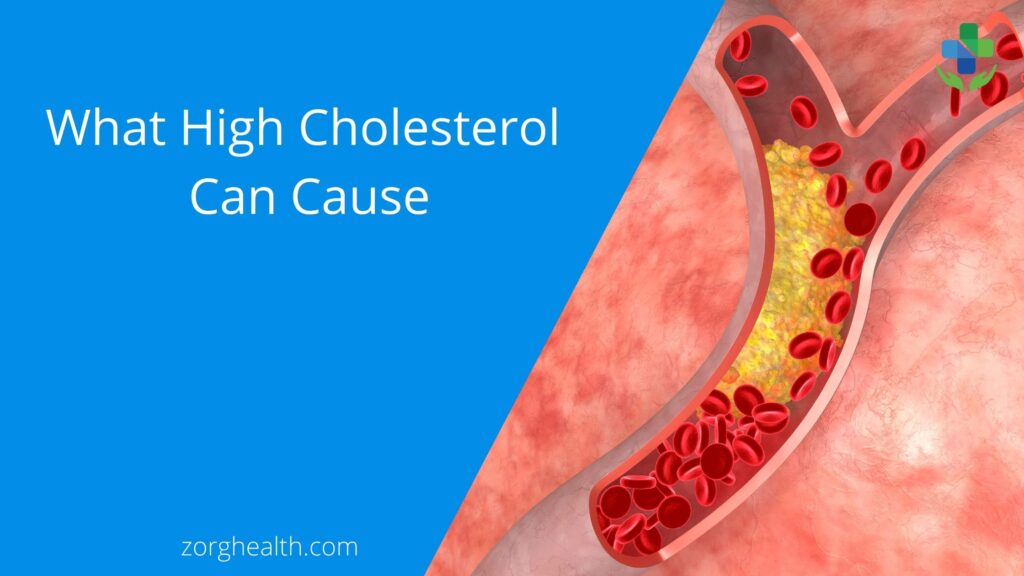High cholesterol is an extremely common health concern reaching out to people globally. Even if you don’t have high cholesterol, you probably know someone who does. Therefore, everyone needs to be alert on the health risks high cholesterol can cause.

High cholesterol rarely causes symptoms in the beginning. That’s why it’s important to get your cholesterol levels checked regularly.
Understanding High Cholesterol
Cholesterol is a waxy, oil-based substance and fat-like in appearance—is present in every cell of the body. The body produces cholesterol, but you also consume it in food.
Cholesterol—both good and bad—is an essential substance for the normal functioning of the body at normal levels. It has important natural functions when it comes to contributing to the health of the cell membrane, digesting foods, producing hormones, and generating vitamin D—without which we could not survive.
Cholesterol doesn’t dissolve in water, so it can’t travel through the body on its own. Cholesterol circulates throughout the bloodstream as a part of two different lipoproteins—Low-Density Lipoprotein (LDL) also called “bad cholesterol” and High-Density Lipoprotein (HDL) also known as “good cholesterol”. What HDLs and LDLs do? They take away cholesterol from cells to be broken down by the liver, while LDLs carry cholesterol to the cells for use.
The human body sufficiently makes all the cholesterol needed for day-to-day functions; people do not need to get it from their diet. As long as the body has cholesterol in the right amounts, this substance is beneficial. However, too much ‘bad’ cholesterol concentration in the blood becomes a silent danger that puts people at risk, especially of the heart. It builds up inside the arteries (also known as cholesterol plaque) and blocks the flow of blood leading to several chronic diseases including blood clots, heart diseases, stroke.
Symptoms of High Cholesterol
Typically, high cholesterol is a “silent” condition and doesn’t cause any symptoms until it causes emergency events of a stroke, heart attack, etc. Generally, such events don’t occur until high cholesterol leads to the formation of plaque in the arteries that changes the makeup of the arterial lining. Plaque can narrow arteries thereby less blood can pass through them causing serious complications.
That’s why routine cholesterol screening is important.
People of all ages, genders, and ethnicities can have high cholesterol. There are a variety of causes that can lead to high cholesterol.
Many factors can cause or increase your risk of high cholesterol:
- Genetic family history of high cholesterol
- How active or inactive you
- Lifestyle habits such as smoking, drinking, consumption of fast food
- Imbalanced diet high in unsaturated fats, trans fat, and cholesterol.
- Age (with advancing age, your cholesterol level tends to rise)
- Gender (LDL cholesterol rises more easily in women, though they tend to have lower “bad” cholesterol until around the age of 55)
- Existing health conditions – Overweight/Obesity/Diabetes
- Medications that increase or decrease levels of LDL/HDL (chemo drugs, steroids)
- Metabolic syndrome
- Hypothyroidism (when the thyroid hormones levels are low)
Risk factors for High Cholesterol
Having high cholesterol can lead to stiffening, narrowing of the arteries. It can also reduce or block blood flow through the arteries.
Lack of sufficient blood flow to your brain or heart can lead to the following life-threatening conditions:
- Stroke
- Heart attack
- Chest pain
- High blood pressure
- Gallstones
- Peripheral vascular disease
- Chronic kidney disease
Diagnosing High Cholesterol
High cholesterol is very easy to diagnose. A blood test called a lipid panel is the only way to know if your cholesterol is too high. A lipid profile measures your total cholesterol, HDL cholesterol, LDL cholesterol, and triglycerides
Get your cholesterol rechecked every 4 to 6 years and more frequently if you have a family history of high cholesterol or are already overweight or have high blood pressure.
Home Remedies to Manage High Cholesterol
Living a sedentary life is a risk factor. As important as what you eat, other lifestyle measures equally play a vital role in maintaining good health. You need a multi-pillar approach to developing lifestyle changes and healthy habits.
Making the following lifestyle changes can be a daunting process, especially as it might involve unlearning some habits while picking up new ones.
- Being more active by exercising (brisk walking, jogging, aerobics, cycling, vigorous activity – at least 30 minutes of moderate-intensity exercise 5 days a week)
- Eating a well-balanced diet (whole grains, low-fat or no-fat dairy, fruits, vegetables, legumes, nuts, seeds, oats, barley, soy, beans, okra, eggplant, avocados)
- Avoiding saturated fats and full-fat dairy products (egg yolks, full cream milk, cheese)
- Choosing lean sources of protein (chicken, fish, legumes)
- Cutting down processed foods (like meats, frozen foods, canned food)
- Eating different types of high fiber foods (whole grains, fruits, vegetables)
- Avoiding processed sugars (sodas, ice cream, energy drinks)
- Eating foods that contain omega-3 fatty acids (fish, walnuts, flaxseeds)
- Opting for baked, broiled, steamed, grilled, and roasted foods instead of fried foods
- Eating a low sodium diet (avoiding especially tinned products with high salt)
- Trying meal kit options designed for several dietary restrictions (low-carb, keto)
- Using healthy oils (sunflower, safflower, avocado, olive oil)
- Taking natural supplements (aged garlic extract, flaxseed, red yeast rice
- Quitting smoking
- Avoiding excessive alcohol consumption
- Replacing saturated fats with processed carbohydrates
- Cooking with more with spices and herbs
- Reducing stress (try yoga, meditation)
- Getting plenty of sleep
- Avoiding substance misuse
Food Applications
Nowadays several smartphone apps can also help you to achieve your goal of lowering your cholesterol through dietary, nutritional, and fitness programs.
Smartphone apps like ‘MyFitnessPal’, ‘MyNetDiary’, ‘Foodvisor’ act like a nutritional coach—helps you to track anything related to your health—from planning meals, keeping tabs on nutrients, to sending nutritional reports, logging your exercise regime, test results, and medications.
Such apps help you eat smarter and more healthfully.
The Bottom Line
High cholesterol can slowly creep upon you, and you may not even realize it as it has no symptoms. If left untreated, high cholesterol can cause serious health complications. Careful management of the condition can help you avoid further complications.
To lower your risk of complications from high cholesterol, inculcate healthy lifestyle habits as part of your life and you will feel better for doing it. Lifestyle changes are certainly the preferred method for cholesterol control.
How to become cholesterol-free? Eating heart-healthy foods is a great place to start. Replacing saturated fat and trans-fat with healthy fats, lean sources of protein, fruits, and vegetables, goes long to see a dramatic effect on your cholesterol levels. Eating a balanced diet, exercising regularly, and avoiding tobacco products may help you achieve and maintain optimum cholesterol levels and promote general health. Note that some people respond more strongly to dietary cholesterol than others.
There are several cholesterol-lowering medications, with the right treatment and management, people with heart disease can live happy, healthy, and fulfilling lives.
Revamping every day habits can go a long way toward lowering cholesterol without medication.
Your health is in your hands.
